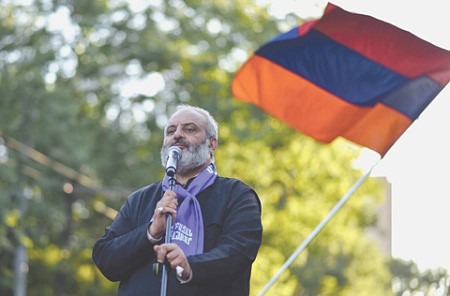Conflict escalates between the Church and the government in Armenia
Archbishop Galstanyan is not just haranguing the crowds, but urging them to storm the palaces of power. According to many, Patriarch Karekin II himself is behind the escalation, denouncing the "continuous policy of unilateral surrender" in relations with Azerbaijan. Prime Minister Pašinyan, on the other hand, calls the bishops "agents provocateurs" who want to lead to war "as in the days of Byzantium".
Yerevan (AsiaNews) - The Armenian Apostolic Church has now taken an explicit political stance of confrontation with the government in Yerevan, with the risk of an increasingly violent radicalisation of the street protests, led by the Archbishop of Tavowš, Bagrat Galstanyan, who continues to repeat that "we will not leave the streets until victory is achieved", that is, until Prime Minister Nikol Pašinyan resigns.
Galstanyan does not just harangue the crowds, but urges them to storm the palaces of power, as has happened in the past few days, trying to lock up the premier and deputies in the National Assembly building in order to force them to appear before the 'people's court' he presides over.
The police began to use strong-arm tactics to disperse the demonstrators, although so far the revolutionary archbishop has not been touched. However, Pašinyan and the supporters of the ruling majority are using increasingly fiery arguments against their ecclesiastical opponents.
According to many statements by members of the Civil Accord party, the patriarch of the Armenian Church himself, the katholikos Karekin II, together with the entire ecclesiastical leadership of the 'Sacred Ečmjadzin', the historic patriarchal seat on the outskirts of Yerevan, is behind the bishop and the escalation of demonstrations.
It is precisely in this religious-administrative centre that the Higher Spiritual Council, the synodal body of the katholikos, meets almost in permanent session. It has issued a statement by the bishops expressing explicit support for the "popular opposition", while distancing themselves from the most violent actions of recent days, in which no members of the clergy are said to have participated.
The text denounced the "continuous policy of unilateral ceding of national territories, justified by demarcation agreements", which has provoked a wave of indignation and concern "both at home and in the diaspora, generating the mistrust that today leads to calls for the prime minister's resignation".
Pašinyan responds to these accusations by lashing out at 'all those who are using the Artsakh refugees for their own mercantile interests', provoking unrest in the streets. To Galstanyan who challenged him to take to the streets, the prime minister responded with a very emotional speech in parliament:
'Of course we meet, do you think the prime minister of Armenia has a problem talking to anyone? If I thought it would be useful to meet the bishop, I would have already had him loaded onto a police van'.
The prime minister directly accused Karekin II of having 'blessed' the riots and clashes with the police, which provoked outraged responses from the bishops, 'we condemn the attempts of the men in power to shift the responsibility for the people's protests onto the Church... instead, they try to justify their own anti-clerical behaviour, as has happened recently on several occasions'. The reference is to the 'Sardaparat' memorial case on 28 May, when the police attempted to exclude the katholikos from official ceremonies to commemorate the Armenians' 1918 battle against the Turks.
The Armenian Church had last year urged the government to carry through the battle against the Azeris over Nagorno Karabakh, from which the army was withdrawn to avoid an all-out war between Armenia and Azerbaijan.
Now Pašinyan calls the bishops 'agents provocateurs' who want to lead to war again, but says that 'we will solve this problem in two or three months'. Recalling events of the distant past with regard to the Byzantines, in which the Church played a crucial role in military operations, he argues that 'this will not happen again today', with the Russians fomenting conflict by using the Church, as the patriarchs and emperors did in Byzantium.
The reinterpretation of history is a characteristic of the wars of the third millennium; while Putin in Russia seeks to re-establish the glories of the past, Pašinyan insists on proposing a new Armenia, one that is not an imitation of the ancient or medieval one, and the religious dimensions become decisive in assessing these prospects.
As the Armenian premier states, quoting passages from the letters of St Paul, 'I want to make a solemn statement: if the Church's relations with the government are bad, then the Church's relations with God will also be bad'.







.png)










